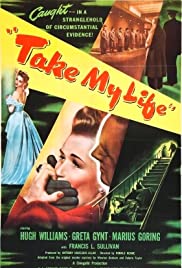
TAKE MY LIFE
UK, 1947, 79 minutes, Black-and-white.
Hugh Williams, Greta Gynt, Marius Goring, Francis L.Sullivan, Rosalie Crutchley.
Directed by Ronald Neame.
Take My Life is a brisk British drama from the immediate postwar industry. It was directed by cinematographer Ronald Neame who was to continue in the British industry but then go to Hollywood making bigger budget films, including The Poseidon Adventure and The Odessa File.
There are some distinctive shots, especially during the murder, that might remind audiences of Alfred Hitchcock films.
The film uses a voice-over technique, coming from the chief prosecutor, played in his frequently-pompous manner by Francis L. Sullivan. The action opens at an opera, a nervous diva, her manager husband, with a voice-over throwing suspicion on him for the murder of a young woman who encountered him at the end of the performance but had a relationship with him in the past.
The audience sees her being murdered. The block of flats owner identifies the manager in the lineup and he goes to trial. Circumstantial evidence is against him. The dead woman is played in a very early role by Rosalie Crutchley who was to have much more sinister roles as she grew older. The manager is played by Hugh Williams and his wife by Greta Gynt, a strong role for her as she supports her husband and goes to find evidence to prove him innocent.
The audience soon sees who the murderer is, played by Marius Goring. So, the dynamic of the film is discovering more the motives of the murderer and following the detecting by the wife, leading her to Scotland, to a school, to the evidence of music, recovering a photo identifying the woman, a dangerous train trip back to London but a rescue from a man who claims to be deaf – but, in fact, is a police officer getting evidence against the murderer.
1. Murder mystery? Detection? Court proceedings? Investigations?
2. Atmosphere of 1947? London, Opera, flats, streets? Hospital? Police precincts? The contrast with Scotland, the school, the chapel? The musical score?
3. The opening with the Opera? The voice-over from the prosecutor? Setting the characters, the situation, his own perspective? Anticipating the guilt of Nicholas? Nerves, the performance, the aftermath, the family and applause? At home, Nicholas going out for the phone call, the encounter with Elizabeth, Philippa and her reactions, throwing the object at Nicholas? His wound? His going out for a walk?
4. Elizabeth, in the orchestra, talking with Nicholas, memories of the past, her dress, the Byron quotation? At home, her murder? The flashbacks, the relationship with Nicholas, love for him, disappearance, the Dutch mother, going to the school, the composition of the song? Her defiance of Fleming? Wanting to deprive him of teaching and his career?
5. The murder sequence? The man with the wound, leaving the house, the owner and he is testifying, picking him from the lineup? The police ringing the hospital’s? Nicholas and the doctor? The doctor having to hold him? His being taken to the precinct, his explanations, the inconsistencies with his wife’s testimony about the quarrel?
6. The court, to build up of the evidence against Nicholas? Philippa and her devotion? Her wanting to pursue investigations? Going to Holland, Elizabeth’s mother, the other connections, the orchestra, the agent?
7. The discovery of the music, Philippa playing it? Her later hearing the boy whistling it? The connection with the school?
8. Philippa and her visit to the school, waiting for Fleming, the tour of the school, her playing the music on the organ, his reaction? Her asking about photos? Going to the shop, not on Sunday night, not making money on Sundays, the Presbyterian Church? Going back the next morning, the wife giving her the negative? Fleming pursuing her to the station, on the train?
9. The audience knowing the identity of the killer, but not his motives for the killing?
10. On the train, the death man, Fleming and his confession and motives? The struggle with Philippa? The rescue by the death man?
11. Her going to the police, the detective coming in, posing his death, having confession, Nicholas freed? The new beginning for them?